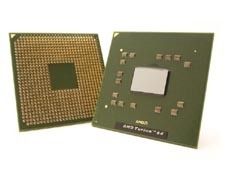AMD adds 2.2 GHz chip to Turion lineup
Sunnyvale (CA) - AMD expands its mobile processor product line with a new flagship model. The ML-40 is clocked at 2.2 GHz and targets thin and light notebooks.
The company claims it is bringing "a new level of performance for highly mobile business professionals" with its latest Turion 64 processor. The chip ups the clock speed of the prior fastest Turion chip ML-37 from 2.0 to 2.2 GHz. The processor integrates 1 MByte of L2 cache, theoretically leaving space for a future ML-38 or ML-39 with 512 MByte cache.
Turion, AMD's first shot to compete with Intel's Centrino platform, is the most confusing processor in AMD's product lineup. When launched back in March, the chip brought a new model numbering system that cannot be compared to any previous AMD or Intel chip, according to AMD. Additionally, the chips are divided in a "ML" and a "MT" series. While "M" stands for "mobile", the second letter indicates the grade of mobility: The further down in the alphabet, the better the mobility. As a result, ML processors are "less mobile" than MT chips, AMD explains. In simple terms, the grade of mobility translates mainly into the thermal design power of a chip: The ML series is rated at a maximum of 35 watts, while the MT requires board designs for only 25 watts.

Pricing of the processor reflects AMD's newly found confidence to challenge Intel in all processor markets. The ML-40 is priced at $525 in 1000-unit quantities. This is slightly more than the $423 Intel charges for its Pentium M 760 (2 GHz, FSB533) and below the $637 for the 765 (2.10 GHz, FSV400). Intel's flagship 770 (2.13 GHz, FSB533) is currently listed at $637 as well.
Intel's aggressive roadmap to push the Pentium M into new notebook and small form factor PC markets will increase the pressure on AMD to increase performance levels for the MT series for what the company may call even more mobile professionals. But it is uncertain, if AMD can follow Intel's pace in the foreseeable time.
Especially Intel's upcoming dual-core Pentium M, code-named "Yonah", is likely to push Intel ahead again: Sources told Tom's Hardware Guide that a dual-core Turion processor should not be expected before 2007.
Related stories:
AMD launches Turion 64 mobile processors, competes with Intel's Centrino
Stay on the Cutting Edge
Join the experts who read Tom's Hardware for the inside track on enthusiast PC tech news — and have for over 25 years. We'll send breaking news and in-depth reviews of CPUs, GPUs, AI, maker hardware and more straight to your inbox.
Most Popular

